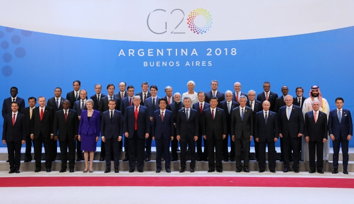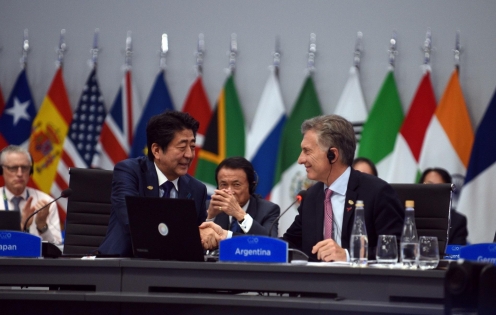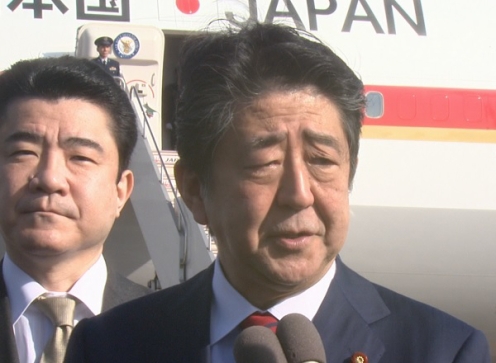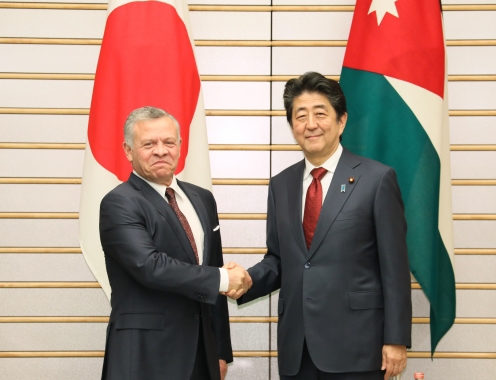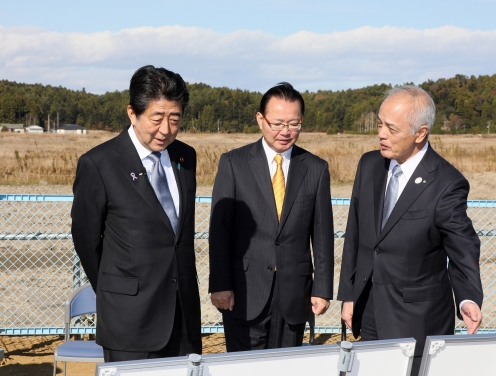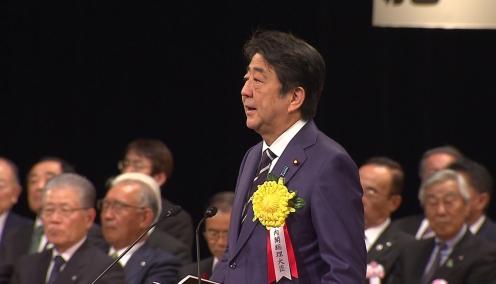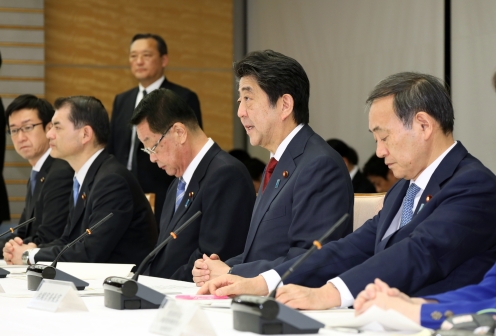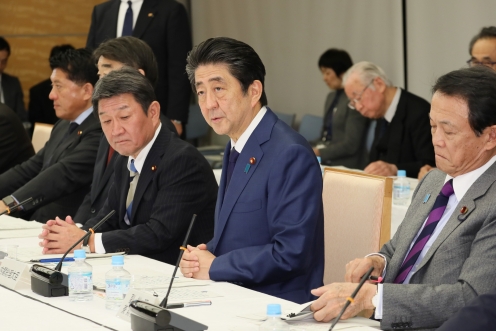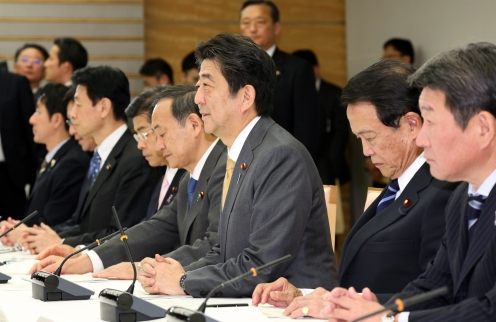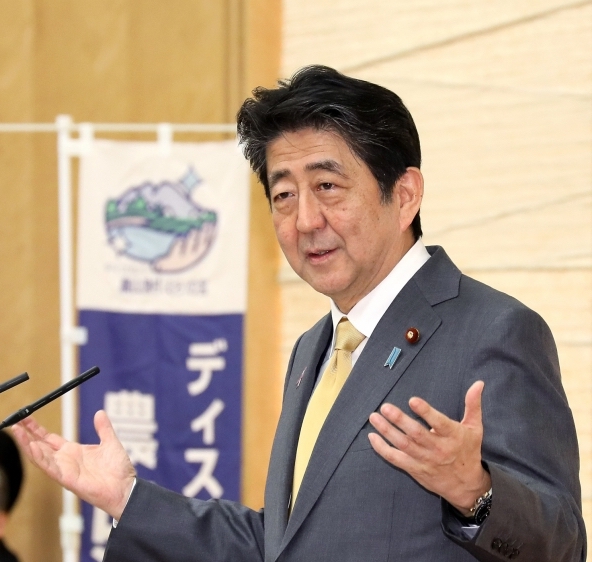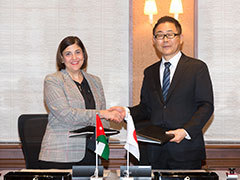G20 Buenos Aires Summit: First and Second Days
Cabinet Secretariat, Friday, November 30, 2018
[Provisional Translation]
On November 29 (local time), Prime Minister Shinzo Abe visited Buenos Aires in the Argentine Republic to attend the G20 Summit on Financial Markets and the World Economy and other events.
On the following day, November 30 (local time), the Prime Minister attended a retreat session. Following that, he was then welcomed by H.E. Mr. Mauricio Macri, President of the Argentine Republic, and attended a commemorative photograph session. After wards, he attended the opening session where President Macri of Argentina delivered his opening remarks.
In the afternoon, the Prime Minister held talks with the Honorable Donald J. Trump, President of the United States of America, and a meeting with President Trump and H.E. Mr. Narendra Modi, Prime Minister of India. Afterwards, he held talks with H.E. Mr. Xi Jinping, President of the People’s Republic of China.
G20 Buenos Aires Summit: Third Day
Cabinet Secretariat, Saturday, December 1, 2018
[Provisional Translation]
On December 1 (local time), Prime Minister Shinzo Abe, who is visiting Buenos Aires in the Argentine Republic to attend the G20 Summit on Financial Markets and the World Economy and other events, held talks with the Rt Hon Theresa May MP, Prime Minister of the United Kingdom of Great Britain and Northern Ireland. Subsequently, the Prime Minister held talks with H.E. Mr. Recep Tayyip Erdoğan, President of the Republic of Turkey. Afterwards, the Prime Minister held talks with H. E. Mr. Donald Tusk, President of the European Council, and H.E. Mr. Jean-Claude Juncker, President of the European Commission.
Around noon, the Prime Minister attended the third session (working lunch). In the afternoon, the Prime Minister attended the closing session, where the communique was adopted and H.E. Mr. Mauricio Macri, President of the Argentine Republic, delivered closing remarks.
Following that, the Prime Minister held talks with H.E. Mr. Vladimir Vladimirovich Putin, President of the Russian Federation.
Thereafter, the Prime Minister held talks with President Macri and attended the signing ceremony of the Japan-Argentina Investment Agreement and the closing ceremony of the 120th Anniversary of the Establishment of the Diplomatic Relations between Japan and Argentina.
Statement by Minister Aso on G20 FMCBG Meeting under the Japanese Presidency
Ministry of Finance, Sunday, December 2, 2018
Statement by Minister Aso
G20 Finance Ministers and Central Bank Governors Meeting under the Japanese Presidency
(Vision of Japan’s G20 Presidency)
10 years have passed since the Global Financial Crisis. While the past several years have witnessed a strong recovery, there are signs that the recovery is now losing steam, with clear downside risks. With heightened financial vulnerabilities, we need to further increase our vigilance and strengthen resiliency to minimize costs in the event of another crisis.
At the same time, the world faces a host of critical long-term challenges, such as aging populations, looming climate change, and a glaring gap in basic infrastructure and social welfare services in developing countries. Meanwhile, rapid technological innovation, while leading to a burst in productivity across industries, comes with dramatic changes in a wide range of areas such as financial services, with job opportunities shifting and the challenge of adapting to changes.
All this comes when support for an international order based on cooperation and openness, one that brought peace and higher prosperity to the world, is under strain, with growing dissatisfaction with economic inequality. There is a serious risk that unless a commitment to international cooperation and openness is restored, the world will retreat to one that is closed and fragmented, which history has shown time and again leads to instability and perverse economic outcomes.
Japan has benefitted perhaps more than any other nation from the cooperation and openness that has characterized the 7 decades after the end of World War II. Having grown to one of the world’s most advanced economies, Japan has a responsibility and mission to protect the international order. Japan is committed to fully harnessing the opportunities offered by its Presidency so as to reinvigorate the G20 and make it a forum where members of the international community will cooperate to address issues facing the global economy.
(G20 role and priorities under Japanese presidency)
The G20 is now in a quite different environment from that at the time of the first G20 summit, established in response to the global crisis. The core mission that the G20 is expected to pursue under current conditions would be to strengthen economic fundamentals for sustainable and inclusive growth of the global economy. The G20 should now refocus itself on missions that are truly essential to the international community, and deliver effectively on such missions.
With this background, we will focus on the following three themes under the Japanese presidency:
Risks and challenges to the global economy;
Concrete actions to strengthen medium-term growth potential; and,
Policy responses to economic and social changes stemming from both technological innovation and globalization.
First, we need to act on the risks and challenges to the global economy. The G20’s ultimate mission in non-crisis times is to monitor global economic risks and work to stem crises before they materialize. This is the most important mission of the G20 as the premier international forum representing a vast majority of the global economy. Consistent with this role, with a view to achieving sustainable and balanced growth, we will also discuss the causes of and possible responses to persistent large external imbalances. We believe that the G20, with its global membership, provides a suitable venue for discussion of this issue. External imbalances are best addressed by restoring saving-investment balances in the context of multilateral cooperation, rather than bilateral trade measures. In the process, we will pay close attention to structural drivers behind saving-investment imbalances such as excessive corporate savings and the impact of aging, and explore policy options to promote the required adjustments. Aging also poses wide-ranging important policy challenges not only for the already relatively older countries but also for rapidly aging countries. Therefore, the G20 will discuss aging in a comprehensive manner covering related issues such as monetary and fiscal policy implications, labor supply challenges, and financial inclusion.
Second, the G20 will focus on concrete actions to strengthen medium-term growth potential, such as investment in infrastructure and human capital. We believe that the G20 should continue to promote the Quality Infrastructure Investment (QII) agenda, as a way of boosting economic productivity. QII will bring positive economic and social spillovers over the long run, beyond the physical value of infrastructure. Specifically, QII helps mobilize additional private sector capital, and forms a solid basis for sustainable growth by generating jobs, building capacity, and transferring technologies. Furthermore, a sustainable growth path needs to be supported by measures to ensure an enabling environment, including those to strengthen resilience against natural disasters. In this regard, disaster risk financing schemes play a critical role.
We will also extend our discussion beyond physical infrastructure to investment in human capital. A sustainable financing structure to promote Universal Health Coverage (UHC) in developing countries is one of the items under this agenda. Finally, we propose that the G20 discuss how to address rising debt vulnerabilities in low-income counties, which have caused grave concern within the international community. We will put emphasis on joint efforts made by borrowers and creditors, both official and private, so as to enhance debt transparency and ensure debt sustainability.
Third, we will take up economic and social changes stemming from technological innovation and globalization. Technological innovation and globalization have been drastically changing the economic and social landscape and business models. Consequently, policy makers in both developed and developing countries face the paramount challenge of maximizing their benefits while minimizing the associated risks without fragmenting the global economic system. Specifically in the area of international taxation, we will continue to have discussions on a review of the existing tax framework triggered by digitalization, in addition to fighting against tax avoidance and evasion. In the financial sector, we will begin our work to address the issue of market fragmentation. We will also take steps to harness the potential benefits of technological innovation, such as distributed ledger technology, while mitigating its risks, including those posed by crypto-assets.
(G20 process under Japanese presidency)
With all of the above in mind, we will make utmost efforts to ensure that the G20 more effectively fulfills its mission by streamlining G20 operations. Our Ministerial meetings and discussions would focus on strategically important issues, while giving political momentum to the important global issues being addressed at international organizations and other international fora. We will also ensure that G20 working groups conduct output-driven and efficient preparatory work, fully utilizing the technical expertise of international organizations.
We, G20 Finance Ministers and Central Bank Governors, are responsible for the future of global economy. I look forward to active and constructive discussions at the G20 on these important issues in building a foundation toward sustainable and inclusive prosperity.
Statement by Prime Minister Shinzo Abe, on the Passing of George H.W. Bush, the 41st U.S. President of the United States
Foreign Affairs, Saturday, December 1, 2018
I was deeply saddened upon hearing about the passing of the 41st U.S. President George H.W. Bush. I extend my deep condolences to his bereaved families as well as to the Government and the people of the United States.
President George H.W. Bush accomplished historic, great achievement by contributing to peace and stability of the international community, including through ending the Cold War with the USSR and taking strong leadership in the Gulf War immediately after that. During the four years of his tenure, he visited Japan twice, where he played tennis with His Majesty the Emperor, hugely contributing to further enhancing the amicable Japan-US relations. President George H.W. Bush was a man of integrity, who was loved by Japanese people.
On behalf of the Government and the people of Japan, I offer my sincerest condolences on the passing of President George H.W. Bush.
Press Conference on Attending the G20 Buenos Aires Summit and Other Matters
Cabinet Secretariat, Thursday, November 29, 2018
[Provisional Translation]
On November 29, 2018, Prime Minister Shinzo Abe held a press conference at Tokyo International Airport (Haneda Airport).
With regard to his attendance at the G20 Buenos Aires Summit on Financial Markets and the World Economy and other matters, the Prime Minister said,
“The G20 accounts for over 80 percent of the global GDP and is an extremely important forum, which discusses free trade and the global economy. In light of Japan chairing next year’s G20, I will emphasize, in Buenos Aires, Japan’s position regarding strengthening the free and fair trade system, and ensuring the sustainable growth of the global economy. Given the great expectations placed upon Japan, I will seek to lead the discussions.
Furthermore, taking this opportunity, I plan to hold a Japan-U.S. Summit Meeting, a Japan-China Summit Meeting, a Japan-Russia Summit Meeting and a Japan-U.S.-India Trilateral Summit Meeting in Buenos Aires. In the Japan-Russia Summit Meeting, based on the agreement reached in Singapore to further accelerate negotiations on a peace treaty based on the 1956 Joint Declaration, I intend to hold in-depth discussions on such negotiations and build momentum for further progress.”
Japan-Jordan Summit Meeting and Other Events
Cabinet Secretariat, Tuesday, November 27, 2018
[Provisional Translation]
On November 27, 2018, Prime Minister Shinzo Abe held a summit meeting and other events with His Majesty King Abdullah II ibn Al Hussein, King of the Hashemite Kingdom of Jordan, at the Prime Minister’s Office.
The two leaders attended a salute and guard of honor ceremony, followed by a summit meeting. Afterwards, the leaders held a signing ceremony and a joint press announcement.
Visit to Fukushima Prefecture
Cabinet Secretariat, Saturday, November 24, 2018
[Provisional Translation]
On November 24, 2018, Prime Minister Shinzo Abe visited Fukushima Prefecture.
The Prime Minister observed a multipurpose medical helicopter at a medical facility in Futaba District, and held an exchange of views with hospital staff.
In the afternoon, the Prime Minister visited the Nakano area in Futaba Town, and held an exchange of views with the representatives of local companies. After that, the Prime Minister visited the area around Futaba Station. Later, Prime Minister Abe visited Azuma Baseball Stadium at Azuma Sports Park in Fukushima City with Mr. Thomas Bach, President of the International Olympic Committee (IOC) and then held a meeting with President Bach at Azuma Gymnasium.
When completing his visit to the area around Futaba Station, the Prime Minister said,
“Here in Futaba Town, centered on Futaba Station, the specified reconstruction recovery zone and its development are finally underway. I truly feel that reconstruction is steadily moving forward, one step after another, here in Fukushima Prefecture.
In Tomioka Town, a medical facility that offers emergency medical services has started operations this spring. Medical care is fundamental to our lives. The Government will exert every effort to develop lifeline infrastructure, including medical facilities, in order to enable residents to return to their homes with peace of mind. Moreover, there is no revitalization without the reconstruction of industries and ‘nariwai’ (occupations and livelihoods that sustain people’s daily lives). In Futaba Town, new business facilities leading to the future of this town are being developed such as the planned establishment of a factory for carbon fiber, which is used in the aerospace field, utilizing the Government’s Subsidies for the Location of Businesses (that Support Independence and Repatriation and Create Employment). I am truly delighted to see the progress in the establishment of new businesses.
Taking advantage of the full opening of the JR Tokiwa Line, scheduled for spring 2020, the Government will exert every effort to promote the revitalization of ‘nariwai,’ utilizing these subsidies, towards the partial lifting of evacuation orders for the area around Futaba Station.
In 2020, Japan will host the Tokyo Olympic and Paralympic Games. After this, I will visit Azuma Baseball Stadium with President Bach of the IOC. I truly hope to demonstrate to the world the successful reconstruction of Japan and Fukushima. There will be no revitalization of Japan without the revitalization of Fukushima. With this strong determination, the Government will stand on the frontlines and do everything it can, not limiting ourselves to the Fukushima reconstruction and revitalization period that ends in 2020, but continuing beyond that, until the full reconstruction of Fukushima is achieved.”
In addition, the Prime Minister said the following about the selection of Japan as the host of the 2025 World Exposition,
“Japan was elected to host the World Exposition in 2025. All of us worked very hard to achieve that and I am delighted by this result.
We won this bid to host this exposition thanks to these dedicated efforts of everyone in Osaka, Kansai, the Japan World Expo Committee, including Chairman Sakakibara and Governor Matsui, Secretary-General Nikai of the LDP, and the Parliamentary League to support this bid. I want to once again express my thanks to everyone involved. I would also like to convey my most heartfelt gratitude on behalf of Japan to the (BIE) Member States that supported us. At the same time, I also commend Russia and Azerbaijan for their own strong bids.
I would like to make this World Exposition one that draws many people around the world to Osaka, Kansai and fills people with dreams and wonders. It is my hope that the power of the Kansai region will invigorate the entire country, including the disaster-affected regions.”
National Congress of Town and Village Mayors
Cabinet Secretariat, Wednesday, November 28, 2018
[Provisional Translation]
On November 28, 2018, Prime Minister Shinzo Abe attended the National Congress of Town and Village Mayors held in Tokyo.
The Prime Minister said in his opening address,
“I extend my heartfelt congratulations for the successful opening of the National Congress of Town and Village Mayors today in such a magnificent manner. The representatives from Yamaguchi Prefecture, my hometown, are seated in these VIP seats right in front of me. I would like to thank the secretariat for this special consideration; at the same time, I feel much pressure. I would like to extend my heartfelt respect to all the town and village mayors for your dedicated work every day on the front lines of local government to develop your communities and improve the welfare of your residents.
To protect our beautiful and traditional hometowns, and pass them on to future generations, it is important to create an attractive community where young people would think that they can find opportunities there and wish to join. The town of Shimanto, located in the middle reaches of Shimanto River, known for its clear waters, was one of the towns confronted by population outflow, particularly young people. Meanwhile, 16 Regional Vitalization Cooperation Volunteers, who came into the town, engage in various missions and are actively participating in the community, adding dynamism, such as becoming an apprentice to charcoal-making artisans, cultivating shiitake mushrooms, or coaching the youth soccer team. 70% of the Regional Vitalization Cooperation Volunteers have settled down there after their term ended and started businesses or other activities. The fusion of people with new ideas and members of the local community generates new vitality in the regions. In order to create such flows of people across the whole of Japan, we intend to strongly support U-turns (from one’s hometown in a local district to a city and back), I-turns (from one’s hometown in a local district to a different local district) and J-turns (from one’s hometown in a local district to a nearby city) among young people, including the expansion of the Regional Vitalization Cooperation Volunteers.
Furthermore, in order to maximize the unique appeals of each region, such as lush natural environments and distinctive local specialties that the residents of the towns and villages have continuously protected and nurtured, we will exert every effort to provide a strong boost for the enthusiasm and distinct creativity of the regions through measures such as the 100-billion-yen Regional Revitalization Promotion Grant.
This summer, various parts of Japan suffered severe damage in the wake of successive natural disasters, including the earthquake in the northern part of Osaka, the heavy rains in western Japan in July, Typhoon No. 21,* and the Hokkaido Eastern Iburi Earthquake. Using the supplementary budget, which was recently passed in the Diet, we will accelerate disaster recovery, and implement various measures with the highest priority, such as safety measures for concrete walls to protect the lives of our children, and the installation of air-conditioning units in public elementary and junior high schools across Japan as a countermeasure to heatstroke. Moreover, to further promote the building of safe communities, we will draw up emergency measures for disaster prevention and disaster mitigation, as well as the building of national resilience, by the end of the year. We will implement them intensively over the next three years. I have issued instructions last week to incorporate the measures among them that should urgently be implemented into the second supplementary budget.
The greatest challenge facing Japan is the declining birthrate and the aging of society. We will tackle this challenge head-on, and promote reforms of the social security system, which is aimed at bringing peace of mind to all generations, from children to the working generation and the elderly, over the next three years.
Going forward, I hope that all the town and village mayors will continue to stand at the forefront as leaders of local communities, and exert your abilities to the fullest for the development of your town and villages. At the same time, I ask once again for your understanding and cooperation in regard to the policies that the Government is promoting.
I would like to conclude my address by extending my best wishes for the further development of the National Association of Towns and Villages, the further success of everyone in attendance today, as well as the further development of local communities. Congratulations once again on this successful gathering today.”
*Typhoon Jebi
Headquarters on Creating Dynamism in Agriculture, Forestry and Fishery Industries and Local Communities
Cabinet Secretariat, Tuesday, November 27, 2018
[Provisional Translation]
On November 27, 2018, Prime Minister Shinzo Abe held the 24th meeting of the Headquarters on Creating Dynamism in Agriculture, Forestry and Fishery Industries and Local Communities at the Prime Minister's Office.
During the meeting, discussions were held on the results of deliberation on the agriculture, forestry and fishery policy reforms, and the draft amendment to the Plan for Creating Dynamism in Agriculture, Forestry and Fishery Industries and Local Communities.
Based on the discussion, the Prime Minister said,
“We will restore the vitality of the agriculture, forestry and fishery industries. With this resolve, the Abe Cabinet has exerted every effort to implement reforms aimed at transforming these industries into a growth sector. Our efforts are steadily beginning to bear fruit, and we will continue to advance further reforms.
To that end, we updated the Plan for Creating Dynamism in Agriculture, Forestry and Fishery Industries and Local Communities today.
With regard to the fishery industry, alongside the first fundamental revision of the Fishery Act in 70 years, which is currently under deliberation in the Diet, we will also put in place adequate budgetary measures, thereby swiftly getting the reforms on track.
Regarding the agricultural industry, we will strengthen the functions of farmland banks (intermediary organizations for farmland management), and accelerate the consolidation of farmland for those who are active in the industry. Advanced technologies that have become a familiar part of our lives, such as robots, artificial intelligence, and the Internet of Things, can also be harnessed to a great extent in the agricultural industry; by next summer, we will formulate a program for realizing the world’s most advanced “smart agriculture,” aiming to dramatically improve the productivity of the industry.
In addition, for the forestry industry, we will also introduce a mechanism to enable private-sector operators to utilize state-owned forests in a stable manner over the long-term, and support further reform.
We will also not let up on our efforts to expand exports of agricultural, forestry and fishery products, as well as food products, in order to ensure that we achieve the target export figure of 1 trillion yen next year.
The Abe Cabinet will continue to raise the banner of reform high, and to put all our efforts into building a new era of agriculture, forestry and fisheries in which young people can place their dreams and hopes. I ask for the continued efforts of all relevant parties toward achieving this goal.”
Joint Meeting of the Council on Economic and Fiscal Policy, Council on Investments for the Future, et al.
Cabinet Secretariat, Monday, November 26, 2018
[Provisional Translation]
On November 26, 2018, Prime Minister Shinzo Abe held a joint meeting of the 15th meeting of the Council on Economic and Fiscal Policy in 2018, the 22nd meeting of the Council on Investments for the Future, the Council on Overcoming Population Decline and Vitalizing Local Economy, and the Council for Promotion of Regulatory Reform, at the Prime Minister’s Office.
At the meeting, discussion was held on the proposed interim review of the economic policy direction, and the Basic Principles of FY2019 Budget Formulation.
Based on the discussion, the Prime Minister said,
“Today, we have invited the representative members from the relevant major councils so as to conduct an interim review on the future direction of the Abe Cabinet’s main economic policies, including the Growth Strategy, regional revitalization, and regulatory reform.
The Growth Strategy plays the central role in our economic policies; we will promote structural reforms, looking ahead to the future, focusing on three pillars: the realization of Society 5.0; the reform towards the social security system oriented to all generations, which is our greatest challenge; and the strengthening of policy measures targeting various regions. On the points raised at today’s review, I would like to make a decision by next summer over the implementation plan including a three-year roadmap, while closely paying attention to the views of the ruling parties. With regard to countermeasures for the planned increase in the consumption tax rate, we have presented the basic policy based on the proposals from the ruling party. For instance, as for leveling the fluctuation between rush demand and the subsequent decrease in demand, we intend to establish guidelines and allow flexible pricing in order to enable an efficient and effective response; we will also shorten the duration of the enactment of the point reward system, which is aimed at supporting micro, small, and medium sized enterprises, and secure a sufficient rate of reward. We will extend supports to those who need the issuance of premium vouchers. Furthermore, we will consider measures such as reducing the tax burden on vehicle ownership, in order to firmly bolster consumption. Towards our forthcoming decisions in the budget formulation process at the end of this year, I would like Minister Motegi to hold in-depth consideration and sum them up, coordinating with the ruling parties, regarding these countermeasures for the planned increase in the consumption tax rate.
Today, I received the response to my inquiry from the Council on Economic and Fiscal Policy on the policy for the Basic Principles of FY2019 Budget Formulation. The economy will continue to be the highest priority of the Abe Cabinet. While closely monitoring the future prospects, such as the trends of the global economy, we have to firmly sustain the recovery trajectory of the economy. At the same time, while advancing steady efforts for fiscal consolidation, we aim to formulate a streamlined budget, including putting in place the necessary budget measures to respond to important policy issues. I would like Minister Motegi, Minister Aso, and other relevant ministers to take thorough actions in these matters.”
Ministerial Council on the Monthly Economic Report and Other Relative Issues
Cabinet Secretariat, Thursday, November 22, 2018
[Provisional translation]
On November 22, 2018, Prime Minister Shinzo Abe attended a meeting of the Ministerial Council on the Monthly Economic Report and Other Relative Issues at the Prime Minister’s Office.
Regarding the assessment of the current state of the Japanese economy, the November Monthly Economic Report states, “The Japanese economy is recovering at a moderate pace.” Furthermore, concerning short-term prospects, the Report states, “The economy is expected to continue recovering, supported by the effects of the policies, while employment and income situation is improving. However, attention should be given to the risks including the effects of situations over trade issues on the world economy, the uncertainty in overseas economies and the effects of fluctuations in the financial and capital markets.”
Gathering of “Discover the Treasures of Farming, Mountain and Fishing Villages”
Cabinet Secretariat, Thursday, November 22, 2018
[Provisional translation]
On November 22, 2018, Prime Minister Shinzo Abe attended the Gathering of “Discover the Treasures of Farming, Mountain and Fishing Villages” at the Prime Minister's Office.
The Prime Minister said in his opening address,
“Allow me to offer some words upon this Gathering of ‘Discover the Treasures of Farming, Mountain and Fishing Villages.’
This event marks the fifth anniversary. Each and every year, when I listen to those impassioned speeches from all of you on your products that have been made with great care and are the pride and treasure of your hometowns, I am always astonished by how each district in Japan is truly overflowing with wonderful treasures.
Above all, the most important thing is to introduce these local charms throughout Japan and the world, and share them with as many people as possible.
Last year I shared the same story at this gathering. One of the examples of how many hidden treasures there are in Japan that locals are not necessarily aware of is the story of Motonosumi Inari Shrine in my home town of Nagato City. The shrine has rows of red torii gates leading all the way to the sea. This used to be a small, rustic shrine that had at most a few thousand visitors a year. Then it happened to be featured on CNN, and became popular as an Instagrammable site. As a result, an astonishing 1 million people visited the shrine last year and the head priest shared his surprise at finding the coins of nearly 100 countries in the shrine’s donation box. This summer, I visited the shrine myself to see if it really was as popular as had been reported. Sure enough, there were in fact many people from around the world visiting the shrine.
Thanks to this, a record-breaking 2 million tourists visited Nagato City last year, and as shops and parking lots have been opened in front of the shrine, a great deal of income has flowed to the local people, and local specialties are flying off the shelves. The shrine has also been covered by other overseas media outlets, and, as a result, this wonderful story has been shared around the world.
I am happy to say that initiatives led by high school students in Aichi Prefecture and Fukuoka Prefecture were chosen and their representatives are joining us today. Together with young people who will lead the next generation, we have begun a truly heartening initiative that will further refine the treasures of Japan’s regions and promote them even more actively around the world.
I hope that you will continue to make great progress, full of pride and confidence that you can reinvigorate your community much more. I, too, will work with you all and do my utmost to protect Japan’s beautiful farming, mountain and fishing villages and create more vigorous communities. Let us discover the many treasures that still lie dormant in Japan and create new treasures as well. I would like to ask all of you to continue your all-out efforts, with confidence in yourselves. I believe that if, through this gathering, we learn more about the many wonderful initiatives taking place throughout Japan and work to spread these efforts further, then each community in Japan will surely gain even more energy.
I am looking forward to speaking with all of you afterwards. Thank you very much for taking the time to visit the Prime Minister’s Office today.”
The UK and the EU’s announcement on the agreement of Withdrawal Agreement and Future Framework (Statement by Foreign Minister Kono)
Foreign Affairs, Monday, November 26, 2018
On November 25, Special Meeting of the European Council was held, where it was announced that the Agreement on the withdrawal of the United Kingdom of Great Britain and Northern Ireland from the European Union and the European Atomic Energy Community (“Withdrawal Agreement”) was endorsed and the Political Declaration setting out the framework for the future relationship between the European Union and the United Kingdom of Great Britain and Northern Ireland (“Political Declaration”) was approved. The documents will now be deliberated at the Parliaments of both the UK and the EU.
The Government of Japan has been looking at relevant developments paying special attention to the UK’s withdrawal from the EU as it could have a major impact on Japan and the international community since the referendum that took place in the UK in June 2016. In particular, in order to minimize negative influence on Japanese businesses and the international economy, Japan has dealt with this issue appropriately including requesting to both the UK and the EU that 1) the withdrawal process needs to proceed with predictability and transparency secured , 2) legal stability should be secured through the establishment of a transition period after the withdrawal, 3)”no deal” should be avoided.
The Government of Japan appreciates that the withdrawal process is making progress in the direction Japan has been requesting. Japan will continue to closely watch relevant developments of the process and take necessary measures including providing information and assistance for companies including Japanese businesses in EU.
New Tax Convention with Denmark will Enter into Force
Ministry of Finance, Wednesday, November 28, 2018
[Provisional translation]
1. On November 27, the exchange of diplomatic notes between the Government of Japan and the Government of the Kingdom of Denmark for entry into force of the Convention between Japan and the Kingdom of Denmark for the Elimination of Double Taxation with respect to Taxes on Income and the Prevention of Tax Evasion and Avoidance (signed on October 11, 2017) took place in Copenhagen.
2. This Convention, accordingly, will enter into force on December 27, 2018 (the thirtieth day after the date of exchange of diplomatic notes) and will have effect:
(a) with respect to taxes levied on the basis of a taxable period, for taxes for any taxable periods beginning on or after
January 1, 2019; and
(b) with respect to taxes levied not on the basis of a taxable period, for taxes levied on or after January 1, 2019; and
(c) The provisions concerning the arbitration proceedings will have effect:
(i) with respect to cases presented pursuant to the provisions concerning the mutual agreement procedure on or
after the date to be agreed between the Governments of the Contracting States through an exchange of
diplomatic notes; and
(ii) with respect to cases presented pursuant to the provisions concerning the mutual agreement procedure before
that date. In this case, no unresolved issues of such case shall be submitted to arbitration before two years have
elapsed from that date.
(d) The provisions concerning the exchange of information and assistance in the collection of taxes will have effect
from December 27, 2018, without regard to the date on which the taxes are levied or the taxable period to which
the taxes relate.
Please check source link for reference.
Signing of Dollar-Denominated Japanese ODA Loan Agreement with Jordan: Improving the business environment in Jordan, which has received a large influx of refugees from Syria, to contribute to self-reliant economic development
JICA, Wednesday, November 28, 2018
On November 28, the Japan International Cooperation Agency (JICA) signed a loan agreement with the Government of the Hashemite Kingdom of Jordan to provide a Japanese ODA loan of up to 300 million US dollars for the Business Environment, Employment and Fiscal Sustainability Reform Development Policy Loan.
The loan will support self-reliant and sustainable socioeconomic development to the Government of Jordan, which faces the challenges of a rapidly increasing population due to a large influx of refugees and of an expanding financial burden resulting from a rise in the number of people requiring public services. This support will work toward improving the environment for SMEs and other businesses, promoting employment especially for youth, women and foreign workers, including Syrian refugees, and appropriately managing public investment.
Specifically, the support will provide the Government of Jordan with policy and organizational reform support in three sectors: the business environment, employment and fiscal sustainability. For the business environment sector, the loan will support a reduction in costs related to government procedures, the advancement of trade and the promotion of SMEs. For the employment sector, the loan will support enhancements to career education for youth, the introduction of part-time work and the simplification of work permit procedures for women and foreign workers. For the fiscal policy sector, the loan will support the promotion of public-private partnerships and the appropriate management of public investment.
The loan will support such improvements in the business environment over the long term while contributing to a reduction in the short-term financial burden on Jordan arising from the influx of refugees and instability in nearby countries.
Details for the project are provided below.
1. Terms and Amount of Loan
Project title: Business Environment, Employment and Fiscal Sustainability Reform Development Policy Loan
Amount (million U.S dollar): 300
Annual interest rate (%)
Project: US dollar LIBOR+1.1%
Consulting services: -
Repayment period (years): 25
Grace period (years): 7
Procurement: General untied
2. Executing Agency
The Ministry of Planning and International Cooperation
Address: PO Box 555, Amman 11118, Jordan
Phone: +962-6-4644466, fax: +962-6-4649341~4642247
3. Planned Implementation Schedule
(1) Completion of project: December 2020 – with completion of the loan disbursement
(2) Issuing of letters of invitation for consulting services: No hiring of consultants is planned for the loan
(3) Tender announcement of initial procurement package for international competitive bidding on project construction: No work in conjunction with bidding is planned for the loan

























